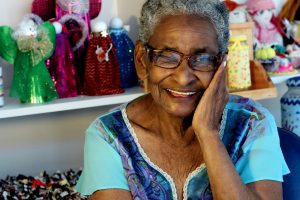Development in Late Adulthood
Learning Objectives:
- Explore and connect Psychosocial, Cognitive, and Psychosexual Development
- Explore and connect another Theory, Approach, or Perspective to work in critical thinking skills for client assessments
- Exploring important aspects of a person’s experience and ability to justify why they are important
Vignette

Alaina is an 85 y/o African American woman who lives alone with her small dog, Gus. Alaina lost her husband a few years ago after a painful battle with prostate cancer.
Alaina and her husband had a wonderful, supportive relationship. Alaina cared for her husband throughout his illness, but it took a toll on her both physically and emotionally. She still struggles with grief over his death and has days where she still cries uncontrollably. Her family checks in on her often but struggle with knowing what to do on days she is experiencing deep sadness. Gus has been a great support for her and has been critical in helping her get through some of her hardest times.
Alaina is aware of the changes that occurred over the years in the neighborhood where she has so many memories and enjoyed life for so long. Despite the increasing crime, she continues to feel safe in her home as she maintains relationships with her friends who live close by and with the support of her church family, who also check in on her weekly.
Alaina has been experiencing some increased health problems recently. She suffers from back pains, osteoporosis, and diabetes. She has been prescribed several medications to manage her health issues and has been experiencing increased side effects due to the new medicines. Alaina works hard to maintain her daily routine but her friends have noticed that she has started to engage in some unusual behaviors, such as walking without Gus or being out alone after dark, as well as self-report she has had some dizzy spells and was falling more. Her friends have shared their concerns with her children, and they have decided to meet with their mother to find out more information to determine how to best support her needs.
Critical Thinking:
- What stage of Erikson’s Theory of Psychosocial Development are they currently in? Are they meeting the goals of this stage? Examples? Are they demonstrating any struggles with their goals in this stage? Examples?
- What theory, approach, or perspective from previous Dimensions (PIE, Biopsychosocial, Sociocultural, or Social Change) would you use to assess this client? Why?
- What do you feel are the most important aspects (physical development, attachment, sexual development, etc) to consider for this client? Why?
References
https://www.cswe.org/Education-Resources.aspx

